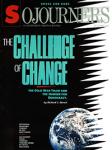The elections this spring in the Soviet Union dramatically demonstrated that while Mikhail Gorbachev has been the symbol and the spokesperson for the striking reforms in that country, the wellsprings of change came from deep within the Soviet people.
The election--the first free balloting since Lenin canceled the results of a 1917 plebiscite--was an unprecedented protest of the power and privilege of the Communist Party and the state apparatus, and a call for speedier and more substantial reform of the Soviet way of life.
But it was also more than that. The results of the voting showed that the remodeling of Soviet society initiated by Gorbachev has grown far beyond what even a visionary pragmatist like the Soviet president could have foreseen. In some ways, today's Soviet Union is as distinct from Brezhnev's as the early Bolshevik state was from czarist Russia--not because the political structures have been immutably altered, but because of changes in the Soviet people themselves. For the first time in Soviet history, the people are acting as if they are no longer afraid.
Gorbachev was able to claim the election results as a mandate for his policies of perestroika and glasnost, and thus emerged with a strengthened hand in his ongoing battle with the more conservative elements of the Communist Party. For one thing, the strong showing of the reform candidates allows Gorbachev to portray himself as a centrist, much as Jesse Jackson's candidacy helped Michael Dukakis position himself toward the political middle.
Across the sprawling nation, in what was universally understood not so much as personality contests but as a referendum on the Soviet system, the party suffered embarrassing defeats. Several powerful city and regional party bosses ran unopposed--and lost. (Voters had the option of crossing out the name of candidates in a sort of anti-vote, an opportunity that surely many American voters have craved in recent years.)
The voters, however, did deliver a few slaps even to Gorbachev's face. Boris Yeltsin is the most famous, but certainly not the only, example. Yeltsin, formerly the head of the party in Moscow, fell from favor with the powers-that-be when he criticized the dawdling pace of the reforms. He was unceremoniously dumped from power, reprimanded as a traitor to the party not only by conservatives but also by Gorbachev himself.
In past years, that would have been the end of the story. But in this new era of openness, Yeltsin did not disappear from the political scene. The spring elections gave him the chance to attempt something virtually unprecedented in Soviet political history: a comeback.
And come back he did. Running in the critical Moscow district against the head of a limousine factory--and against the explicit designs of the party establishment--Yeltsin collected 89 percent of the vote, and became a symbol of a nationwide populist upsurge against party privilege, power, and perks. While careful to insist that he is still a supporter of Gorbachev and his reforms, Yeltsin has emerged as the leader of the "loyal opposition" to the government.
The 2,250-member Congress of People's Deputies elected this spring is relatively powerless. Its primary responsibility in its twice-yearly meetings is the selection of a new 422-member Supreme Soviet that will be a real decision-making body. Whether the makeup of the Supreme Soviet reflects the results of this spring's election will be an important indicator of how far the winds of democracy will be allowed to blow in the Soviet Union.
The openings thus far, of course, still don't make the Soviet Union a democracy. Certain questions remain off limits in the national debate (although the same could be said of some of the most basic issues in this country). And the freedom to organize alternative political parties and freely contest elections--a necessary condition of genuine democracy--continues to be proscribed by the Soviet leadership.
THERE ARE ENCOURAGING signs that the transformation evidenced by the Soviet elections has profoundly altered the world political landscape: the legalization of Solidarity and the beginnings of authentic power-sharing in Poland; the growth of multiparty democratic socialism in Hungary; and the series of innovative and promising disarmament proposals from Gorbachev, which have fallen on deaf ears thus far in the West. In addition, a revamped Soviet foreign policy is emerging, one that rejects a basic tenet of Marxist-Leninist doctrine--the "export of revolution"--and pledges to scale down to a level of conventional and strategic weaponry sufficient only for defense.
But there are also perilous pitfalls ahead, dangers that could derail much of what has been accomplished in the Soviet Union. The population has yet to receive direct benefits from the programs of perestroika. Unless the economic reforms start increasing the amount of food and other goods on market shelves, patience with Gorbachev's reforms might soon wear thin.
Under glasnost, the sentiment for local sovereignty among many of the country's 100 nationalities has developed into full-fledged movements for autonomy, if not in-dependence. The state's response has already been harsh. A demonstration for more self-sufficiency in the southern republic of Georgia was met with bitter violence by the authorities, who reverted to the language of old, calling the demonstrators "anti-Soviet" and "extremists."
The Soviet legislature recently passed laws that threatened fines and long jail sentences for those who challenge the "central authority" of the state. Clearly, there are some bottom-line issues--the perseverance of the nation being foremost among them--over which the government, including Mikhail the Reformer, will brook no opposition.
Nonetheless, the steps toward emancipation that have occurred are real. A hunger for liberty and democracy has been set loose that will be difficult to control. While it is impossible to predict which direction the winds will blow, it is an inescapable fact that a fresh breath of change has blown across the Soviet Union and the world.
Jim Rice is editor of Sojourners.

Got something to say about what you're reading? We value your feedback!
